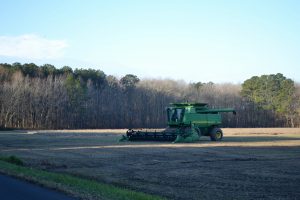
SNOW HILL – County officials agreed to increase funding to an agricultural land preservation program.
The Worcester County Commissioners voted 6-1, with Commissioner Ted Elder opposed, to commit roughly $64,000 to the Maryland Agricultural Land Preservation Foundation (MALPF) program. The commitment will ensure the county remains eligible for state funding toward easement acquisition.
“When we put this in, we get almost 2 to 1 return from the state on this money,” said Bob Mitchell, the county’s director of environmental programs.
According to Mitchell, the county needed to commit a minimum of $14,385.14 in matching funds for the purchases of easements in fiscal year 2019 and to remain certified through the MALPF program. As a certified county, Worcester is able to retain 75 percent of the agricultural transfer tax it collects. Otherwise, the county would be able to keep just 33 percent.
Though the minimum contribution was $14,385.14, Mitchell said staff recommended committing $64,385.14. The additional $50,000 would come from the county’s $360,000 in encumbered funds.
Commissioner Josh Nordstrom, the board’s newest member, questioned the recommendation.
“Maybe I just don’t have the background here,” he said. “What are the pros and cons of this?”
Mitchell explained that with the additional funding, the county would likely be able to fund another easement each year.
“We have a priority preservation area as an amendment to our comprehensive plan,” he said. “Our goal acreage is 800 acres a year. We’ve been falling a little behind on that mostly because of the state not funding this program fully.”
By maintaining a healthy balance in the account, Mitchell said the county would be able to ensure funding was available whenever opportunities for easements arose.
Commissioner Jim Bunting pointed out the $50,000 being referenced was money the county already had from agricultural transfer tax collections.
“The $50,000 is money we have that has already been collected,” he said. “It would not be a burden on the taxpayers.”
Commissioner Ted Elder said that while it was funding the county already had, it had originally come from taxpayers. He asked if the land preservation process resulted in taxpayers being able to use the land.
“No, you’re looking at preserving land and you’re looking at preserving critical agricultural land,” Mitchell said.
Staff said the county currently had 8,000 acres protected through the MALPF program and 12,000 acres protected through a similar program. Elder said that meant that the government controlled 30 percent of the county’s land.
“This is still in private ownership,” Mitchell replied. “You’re giving up your development rights.”
Elder said that if you paired the protected land with government-owned land, a large portion of the county was spoken for.
“The citizens of the county will never be able to use any of these lands for anything,” he said.
Mitchell said MALPF was designed to preserve farmland and promote functioning farms.
Elder argued, “This is a lot of money to be investing — a lot of government money, taxpayer money — into lands that can never be used by any of the people who are paying it.”
Elder added that people had to be “land rich” to even participate, as the minimum was 50 acres.
“It’s taxpayer money and it’s going to individuals who are land rich now that continues to own the land, continues to do the same thing they’ve done with the land, usually for three or four generations, and have no plans of doing anything different with the land for three or four generations, but basically gets six figure returns on this for absolutely nothing but signing a piece of paper,” he said.
Mitchell said he disagreed.
“You’re giving up your development rights,” he said. “Someone could come in and make a cul de sac here and build a development of homes. Then you’ve segmented the land. You still could farm it but it’s not going to be the same as before. Before, you had a neighbor come right down and harvest the land, harvest all this land and come right down the lane. You can’t do that when you segment the farm. Breaking up the farm does away with our critical mass and our agriculture infrastructure.”
Elder maintained that the program benefited wealthy landowners. Commissioner Bud Church, however, spoke up in favor of it. He said he’d been selling real estate in Worcester County for 48 years and had seen a lot of farms go under contract.
“We’re not looking at this program as it is today,” he said. “We’re looking 40, 50, 60 years down the road when you don’t know what development will come in. If there’s an opportunity for us now to preserve a lot of our rural lands and protect them for future generations I’m all in favor of it.”
The commissioners voted 6-1, with Elder opposed, to approve the funding allocation.

